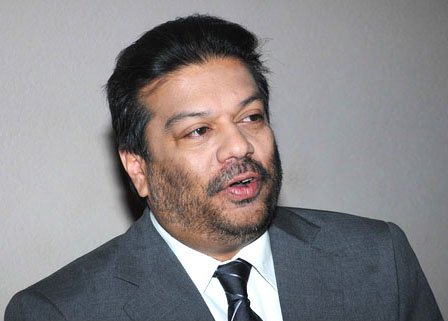Vir Sanghvi
Most Admired Journalist, Columnists & Talk Show Host
 |
Vir Sanghvi (Born 5 July 1956) is an Indian print and television journalist, columnists and talk show host. Currently, he is Editorial Director of the Hindustan Times, and Advisory Editor of HT Media Ltd, for which he writes the Counterpoint and Rude Food columns. At 23, he was the founder-editor of Bombay magazine, before moving on to edit Imprint, and finally editing Sunday magazine, which he did for over 12 years.
Early Life & Education : Vir Sanghvi was born in London and brought up in Mumbai and London. He was educated at Mayo College, Ajmer, and Mill Hill School, London. He won the Inlaks scholarship to read politics, philosophy and economics at Brasenose College, Oxford.
Career : Sanghvi is among India's leading print and TV journalists. Currently, he is Editorial Director of the Hindustan Times. His journalistic career began in his gap year before Oxford when he started contributing to India Today. He continued writing for the magazine during his vacations and in 1978, the publishers of India Today asked him to start Bombay, India's first city magazine. At that stage, Sanghvi was 22, making him the youngest editor in the history of Indian journalism. The first issue of Bombay appeared in 1979 and though the magazine was an instant success, heralding the start of India's magazine boom, Sanghvi left it in 1981 to live in London for a year. Awarded a traveling fellowship by the Inlaks Foundation, he visited newspapers in the US and the UK for a project on how the western media looked at India. In 1982, he returned to India as editorial director of Business Press, India's largest publisher of trade magazines. While at Business Press, he revamped and reformatted Imprint, one of India's oldest magazines and turned it into a leading features magazine of the 1980s.
In 1986, he was appointed editor of Sunday, a newsmagazine brought out by the ABP group. By 1989, Sunday had become India's largest-selling weekly newsmagazine. In 1994, Sanghvi became consulting editor of the ABP group, whose portfolio included-other than magazines like Sunday and Businessworld-the two largest papers in eastern India, The Telegraph in English and Ananda Bazar Patrika in Bengali. In 1999, he became editor of the Hindustan Times, the largest-selling English newspaper in Delhi and, over the next two years, launched new editions in Chandigarh, Calcutta, Ranchi, Bhopal and other north Indian cities. At the end of 2003, Sanghvi was appointed editorial director of HT Media Limited, the holding company of Hindustan Times, and it was in this capacity that he launched the paper's stunningly successful Bombay edition in July 2005. His column, Counterpoint, which he began in Sunday, now appears in the Sunday Hindustan Times, and is possibly the most influential political column in the country. He also writes Pursuits-a column that appears in the weekend section of Mint, the business paper brought out by HT Media.
These apart, Sanghvi is a foodie, writing the inimitable-and hugely popular—Rude Food column in Brunch, Hindustan Times' Sunday magazine. A collection of these columns was published by Penguin in 2004 (Rude Food). The book won the international food world's equivalent of the Oscar-the Cointreau Award for Best Food Literature Book in the world the following year. Alongside, Sanghvi also won the Best Food Critic award from the Indian Culinary Foundation. He did a television version of Rude Food for the Discovery Travel & Living channel called A Matter of Taste which was a huge ratings success in India and South East Asia. Sanghvi's TV career began in 1994 on Doordarshan, the state-owned broadcaster. Starting 1996, he hosted a number of programmes for the STAR Network. Among his successes are shows like A Question of Answers, Cover Story and Star Talk. In 2006-07, he anchored two shows for NDTV, India's leading English news channel-Face the Music and One on One. He has won innumerable TV awards for his presenting skills at many national and international forums including the Asian Television Awards in Singapore.
In 1993, Sanghvi was named a Global Leader of Tomorrow at the World Economic Forum in Davos and he is a member of several important advisory bodies attached to the Indian government, including the prestigious National Integration Council. In 2008, he also received the prestigious Rajiv Gandhi Journalism Award, at a nationally televised ceremony. His published books include Rude Food, India - Then and Now and Men of Steel (a collection of profiles of India's leading businessmen) which has been translated into 10 other languages and is a huge best-seller. Penguin will publish his biography of Madhavrao Scindia this winter.
Awards :
1995 : He was selected as a global leader of tomorrow by the World Economic Forum, Davos.
1998 : He was commended as the best current affairs presenter at the Asian TV Awards.
2004 : The Cointreau Award for Best Food Literature Book in the world the (food world’s equivalent of the Oscar).
2004 : The Asian Television Awards in Singapore.
2004 : He won the Best Food Critic award from the Indian Culinary Foundation.
2008 : The Rajiv Gandhi award for Journalism.
2008 : The friend of Thailand Award from The Thai Prime Minister.
2009 : Lokmanya Tilak National Journalist Award From The Kesari Newspaper, Pune.
2010 : AIMA Media Person Of The Year Award.
Books By Vir Sanghvi :
• Men of Steel - Indias business leaders in candid conversation with Vir Sanghvi, Roli Books Pvt Ltd, India (Jan 2007) ISBN 8-17-436474-7
• Rude Food : The Collected Food Writings of Vir Sanghvi, Penguin Putnam (2004) ISBN 0-14-303139-2
• India Then and Now : Now/Vir Sanghvi. New Delhi, Roli, 2006, 274 p., $120. ISBN 81-7436-397-1.
• 26/11 : The Attack on Mumbai, Penguin, 2009, ISBN 9780143067054
• Madhavrao Scindia : A life, Penguin, 2009, ISBN 9780670082544
-----------------------------------------------------
Information Courtesy : Mr. Mahavir S. Chavan
-----------------------------------------------------
Mail to : Ahimsa Foundation
www.jainsamaj.org
R130111